
Google Title Tag Update: What Do Experts Suggest On Optimizing it in 2022?
Google is going all-in on user experience.
With the introduction of Core Web Vitals and a host of other user-centric updates, the increasing obsession on optimizing the user’s search journey — from entering a search query to landing on the right page with the best possible content quality, relevancy, and load speed — is Google’s be-all and end-all.
And the recent meta title update is no different. After all, one of the first ways people determine which search results are relevant to their query is by reviewing the titles of listed pages.
In this post, let’s take a look at what the update is about, its impact, the tools you can use to analyze your title tag, and some expert thoughts on this new update.
Google’s New Meta Title Update: What Changes Did Google Make?
In the past, Google used meta information to display title tags that are more relevant to a searcher’s query. On August 24, 2021, Google announced a new system that can generate titles for web pages in a revamped way — the system will now focus more on accurately describing what a page is about instead of adapting to the search query.
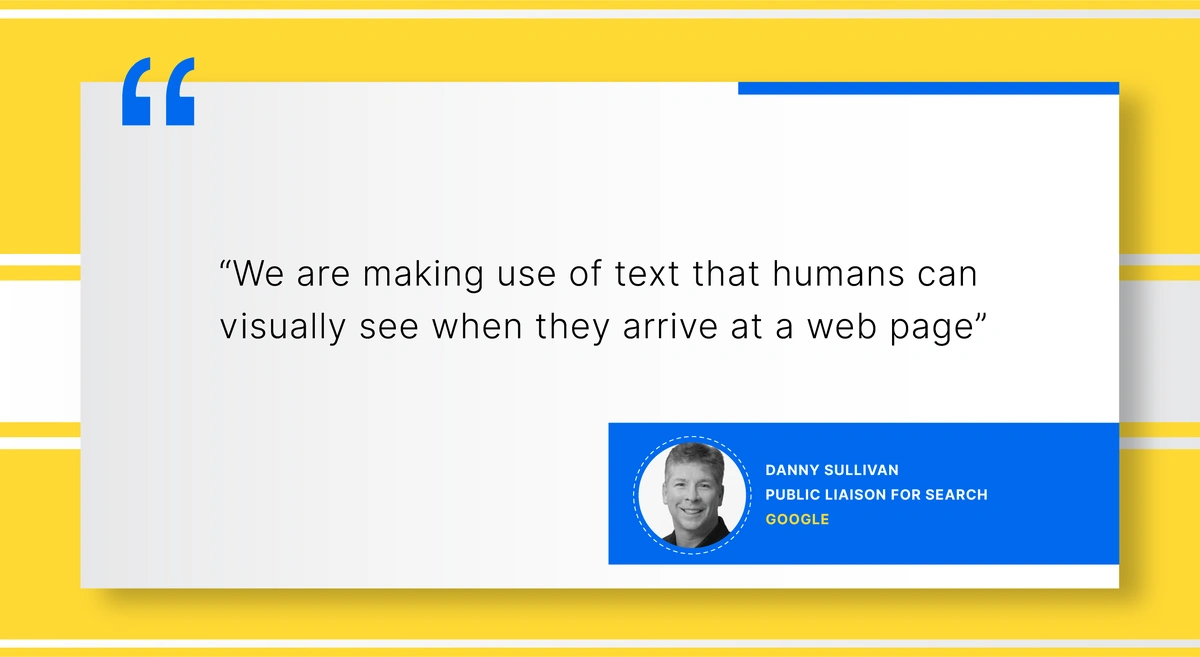
The new system aims to deliver titles that are relevant to the page’s content regardless of the query. Google is now also using the page’s text content to create relevant title tags.
“In particular, we are making use of text that humans can visually see when they arrive at a web page. We consider the main visual title or headline shown on a page, content that site owners often place within <H1> tags or other header tags, and content that’s large and prominent through the use of style treatments. Other text contained in the page might be considered, as might be text within links that point at pages,” explained Danny Sullivan in the announcement blog post.
Furthermore, the most recent update to the system means that title elements are now used around 87% of the time, rather than around 80% before.
Understand How Google Generates Titles for SERPs
Sullivan’s explanation of how title links in Google Search are created for better relevancy provides a good primer on what sources are used to build title links in the SERPs.
Let’s better understand how Google detects issues in titles and rewrites them with its new and improved system. And what better way to do that than by looking at examples straight from the horse’s mouth:
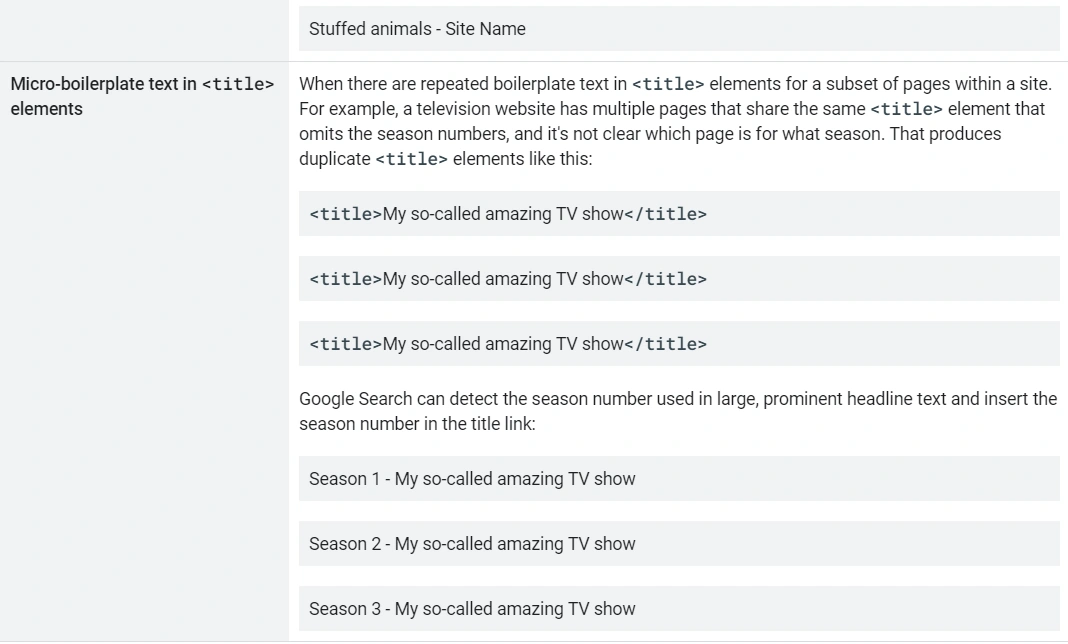
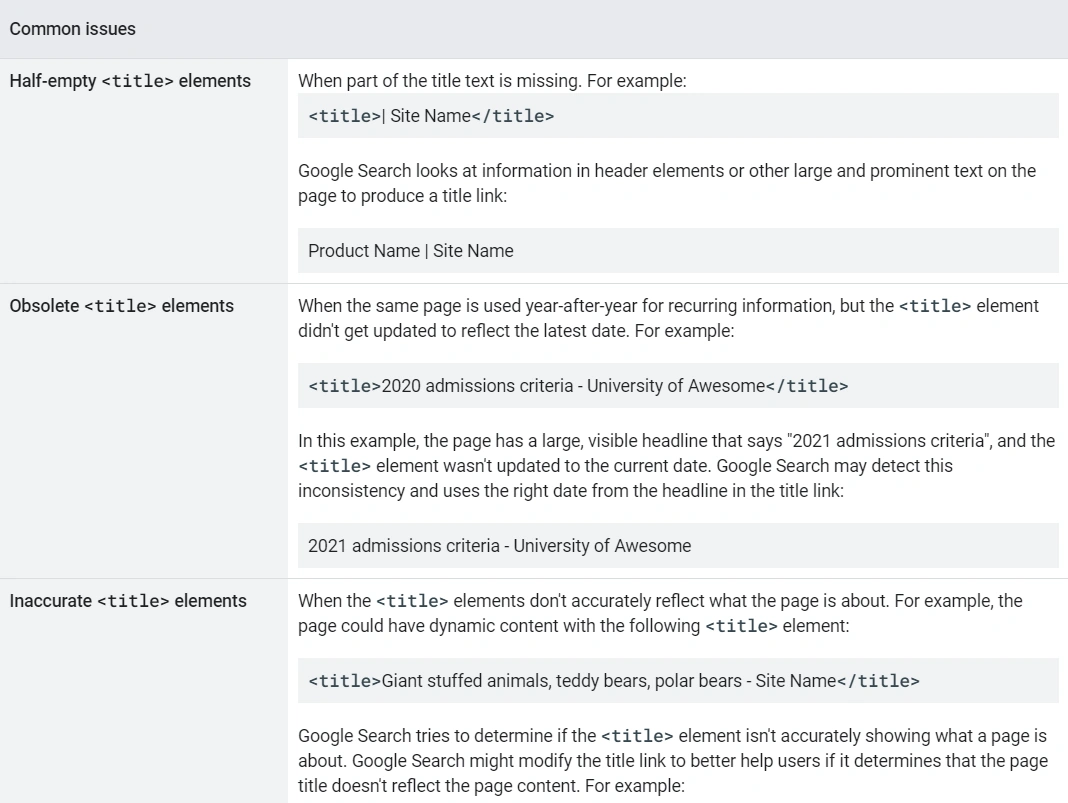
Impact of Changes On Websites
For the most part, since this update only affects the visual aspect in the SERPs, only your CTR may be affected, and not your ranking positions. That is, if Google chooses to rewrite a page’s title tag with something that does not match the context of the page, it can cause users to scroll past the result, leading to a drop in CTR.
However, a drop in CTR can indirectly and ultimately impact your rankings, too.
So, what can you do about it? Let’s hear some experience-backed tips from the experts.
How to Prevent Google From Rewriting Your Title Tags: Experts Thoughts On New Changes
If at this point, you’re wondering “How can I stop Google from rewriting my title tags?”, then we have some experts to the rescue.
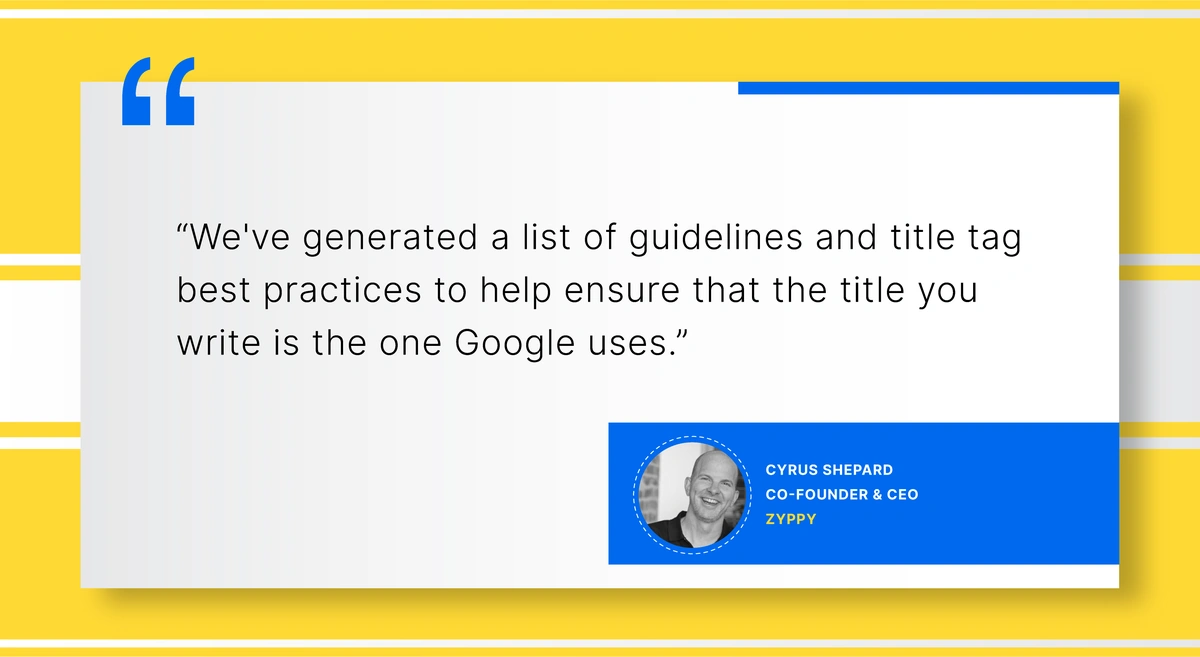
Cyrus Shepard, Co-Founder & CEO at Zyppy shared some actionable guidelines:
“We’ve generated a list of guidelines and title tag best practices to help ensure that the title you write is the one Google uses. In summary, these guidelines are:
- Make sure your title is relevant to the keywords visitors use to find your site. Use Google Search Console (or a reliable keyword tool) to ensure you’re using the right keywords.
- Avoid ‘marketing’ clickbait – especially when it’s not especially relevant to the page content
- Keep your title length between 500-650 pixels. Google tends to rewrite titles that are both too long and too short.
- Avoid repeating keywords. If you use the same keyword more than once, Google is more likely to rewrite it, favoring unique keywords instead.
- Don’t use irrelevant boilerplate. A boilerplate is the part of a title that is used across several title tags. Examples might include your brand name or site section, e.g. ‘Recipes from the NYTimes.’ Boilerplate is often fine to include in titles, but if it’s irrelevant to the actual page, Google may remove or replace it.
- Move away with brackets and pipes. In this latest update, we’ve seen Google come down hard on content within [Brackets] and pipes ‘|’ as separators. Better these days to simply use dashes ‘-’.
- Match your title with your H1. If you are frustrated with Google rewriting your title, try making sure your H1 headline matches your title tag. This is probably one of the easiest ways to get Google to respect your title.”
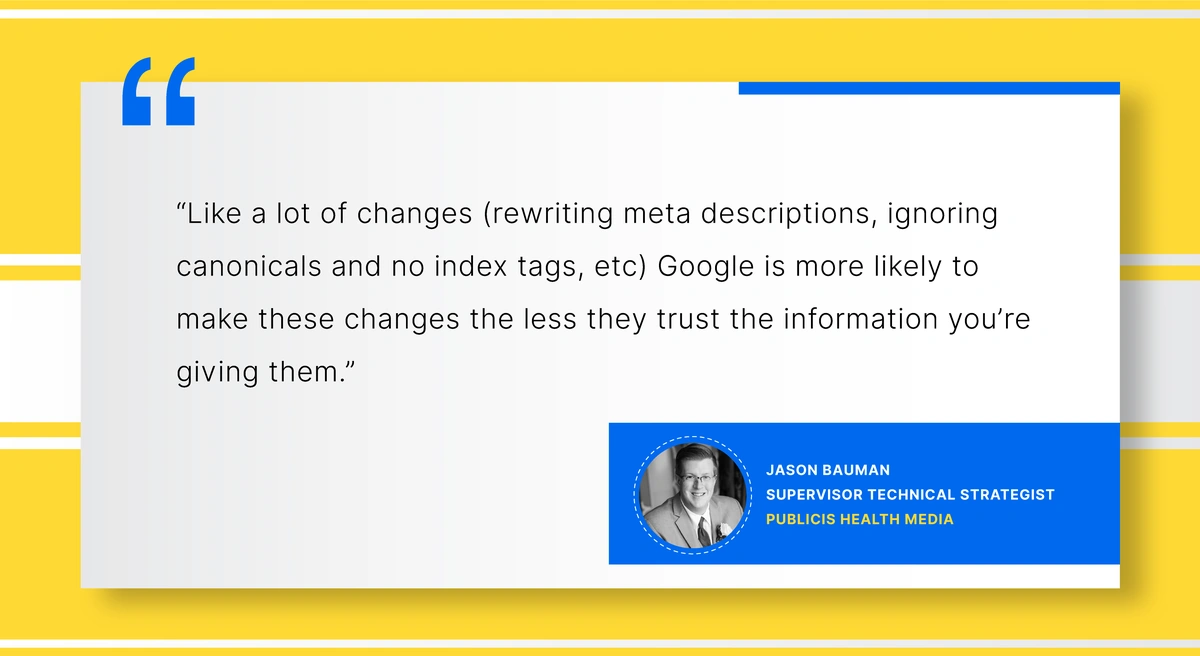
Jason Bauman, Supervisor Technical Strategist at Publicis Health Media also provided a few practical tips to prevent Google from rewriting title tags:
“To my knowledge, there is not a way to guarantee that Google will stop rewriting your Title Tags, as they will make these changes as they see fit. However, like a lot of changes (rewriting meta descriptions, ignoring canonicals and no index tags, etc) Google is more likely to make these changes the less they trust the information you’re giving them. Google is rewriting title tags to try and find the ‘best’ answer based on how it interprets the content on the page. You can’t eliminate them doing this, but you can:
- Keep the title length manageable: The whole context of your title should be clear within the pixel width of a title tag in Google SERP on mobile devices.
- Keep the title relevant: Your title tag should match the content users see on the page, both thematically as well as being similar to the H1 and related H2s. Don’t put information in the title tag (a question, a target keyword, etc) that isn’t backed up in the content.
- Look at SERP landscape for title structure: In some cases when Google re-aligned our title tags, they seemingly did it to bring the structure more in line with our organic competitors. If your title tags are totally out of step with your competition, look at how Google is changing them.
- Keep your H1 relevant as a backup: Having your H1 be a ‘backup’ title (not duplicate, but a similar concept) can help reduce the negative impact of a title rewrite since Google seems to be pulling alternates quite often from here.”
You can use JetOctopus to find empty/duplicate/long titles and meta descriptions.
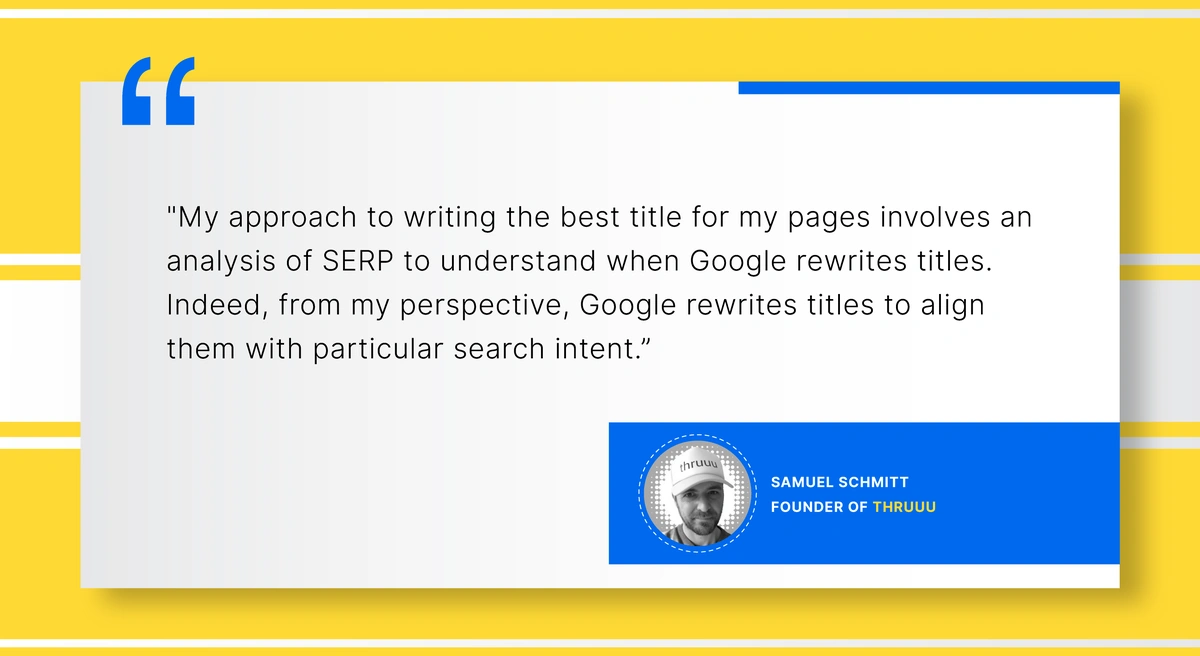
Samuel Schmitt, Founder of thruuu shared some handy first-hand insights too:
“My approach to writing the best title for my pages involves an analysis of SERP to understand when Google rewrites titles. Indeed, from my perspective, Google rewrites titles to align them with particular search intent.”
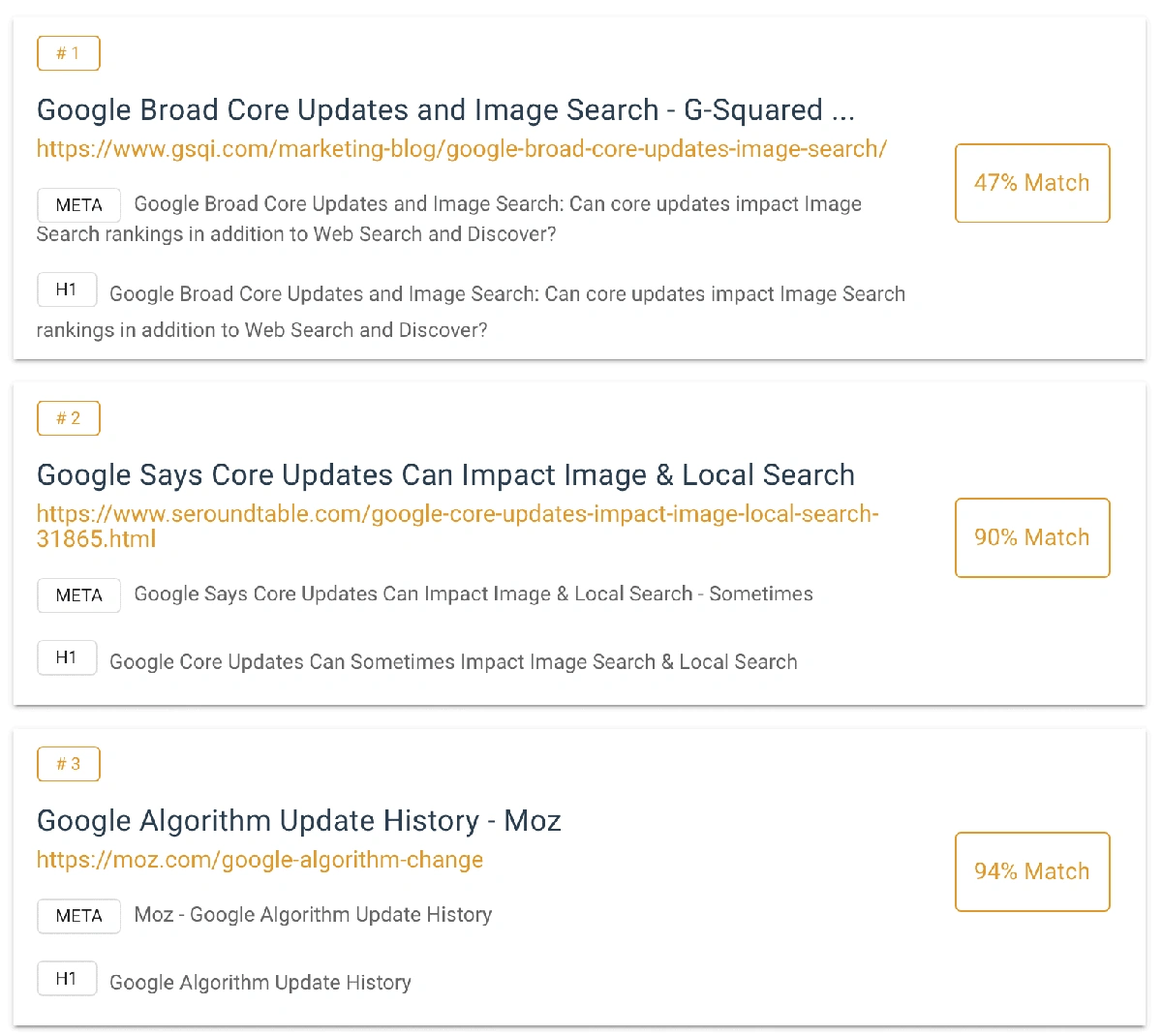
“I can assume what a user wants and craft the best title by understanding what Google wants (to display). The awesome SERP analyzer thruuu helps me with this process and identify when titles or descriptions are changed for any SERP. However, there is no magic formula, so finally, my recommendation will be to put the best title on your page—a title describing your page and informing your audience about what they will find on it,” elaborated Schmitt.
“Unfortunately, we cannot control whether Google rewrites a title but we can at least decrease the chance of having it completely rewritten. I noticed that pages with a bit of keyword-stuffed titles had their titles rewritten the most. The advice here is to use the title (now known as the title link) as the summary of the page written in a natural and enticing way and having the top keyword blended in naturally,” answered Olga Zarzeczna, SEO Consultant at SEOSLY.
Devendra Saini, SEO Head at MPL shared some useful tips:
“Make the titles more crisp, short & meaningful.
- In most cases, the titles were getting fetched from H1s & H2s. On Transactional Pages we removed the exact match repetitions of target keywords from Headings & Added Semantic/Longtail Phrases. We found that titles again rolled back to normal on SERPs.
- On the Informational pages/Blogs/Articles what we did was we only removed “Title tag” & Only kept H1 as our primary heading and it actually didn’t change any rankings and all our changed H1s were showing in the SERP Titles.
These experiments might differ from website to website but with experience, I have felt that the importance of Meaningful Headings helps a lot rather than just stuffing keywords in Titles & Header Tags.”

Next up is Kyle Kozie, Vice President of Search at LSEO, with a rather realistic answer:
“The correct answer is you can’t. You cannot control what Google is going to do on their own search engine, but you can do your best to give the best title tag you can based on the headings used and content of the article.”
“You should take into consideration the goal of the content or why you are writing the page, and do your best to make that reflected in the title. You can also add a layer of research as to what the other title tags look like on page 1 for the keyword or query you are targeting and make a similar one. After all, some of these titles could be what Google is creating itself,” explained Kozie.
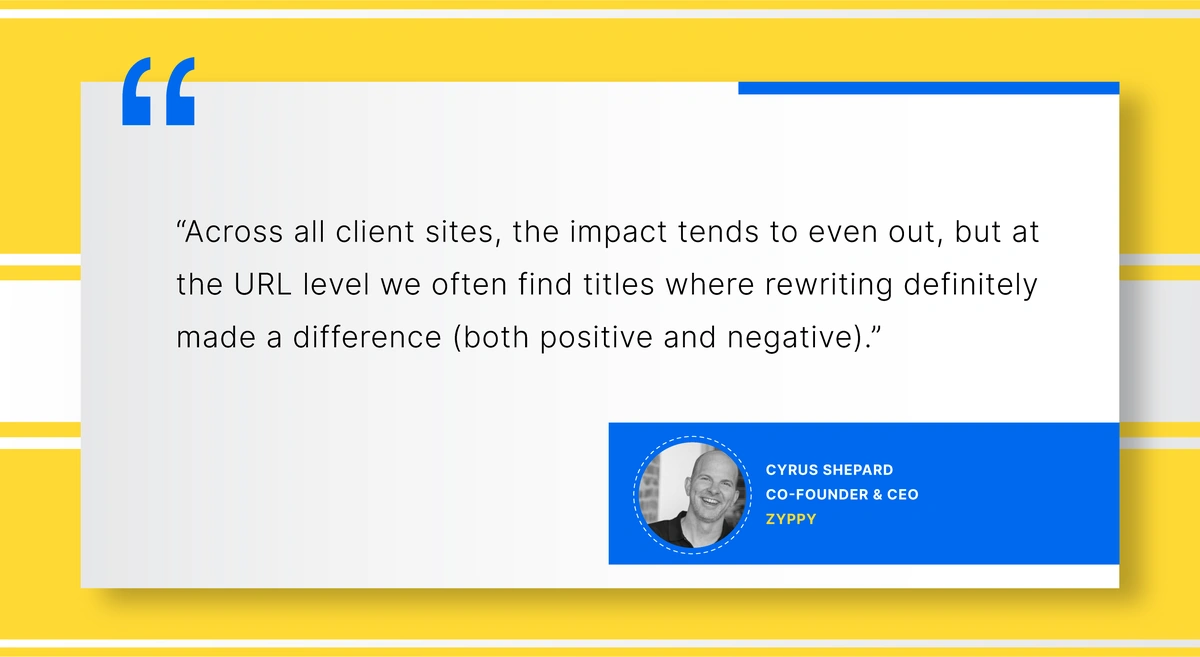
Next, we asked agency experts how this update impacted their clients in terms of organic traffic.
“While we’ve seen Google rewrite a massive amount of titles, there’s no clear consensus on whether the overall effect is helpful or hurtful. On the individual level, Google can get rewrites massively wrong, but the rewrites can also help traffic for a number of URLs. Across all client sites, the impact tends to even out, but at the URL level we often find titles where rewriting definitely made a difference (both positive and negative),” explained Cyrus Shepard.
“I am in an unusual position because in general, the rewriting of titles hasn’t been a facet we’ve had to deal with a lot. While some of my clients had more titles rewritten than others, pushing updates to our title tags to fix the issue can take a long time because most of my clients operate in regulated industries. A member of our team built a tool that helps us check for changed title tags, and we’re working on creating a way to make changes, but our industry (likely due to regulation) was not impacted nearly as much, and any changes we push likely won’t happen until next year,” replied Jason Bauman.
“So far, I didn’t notice any traffic change caused by Google Title Update for the various websites I managed. Maybe this is also due to how I pick the right title for my content,” answered Samuel Schmitt.
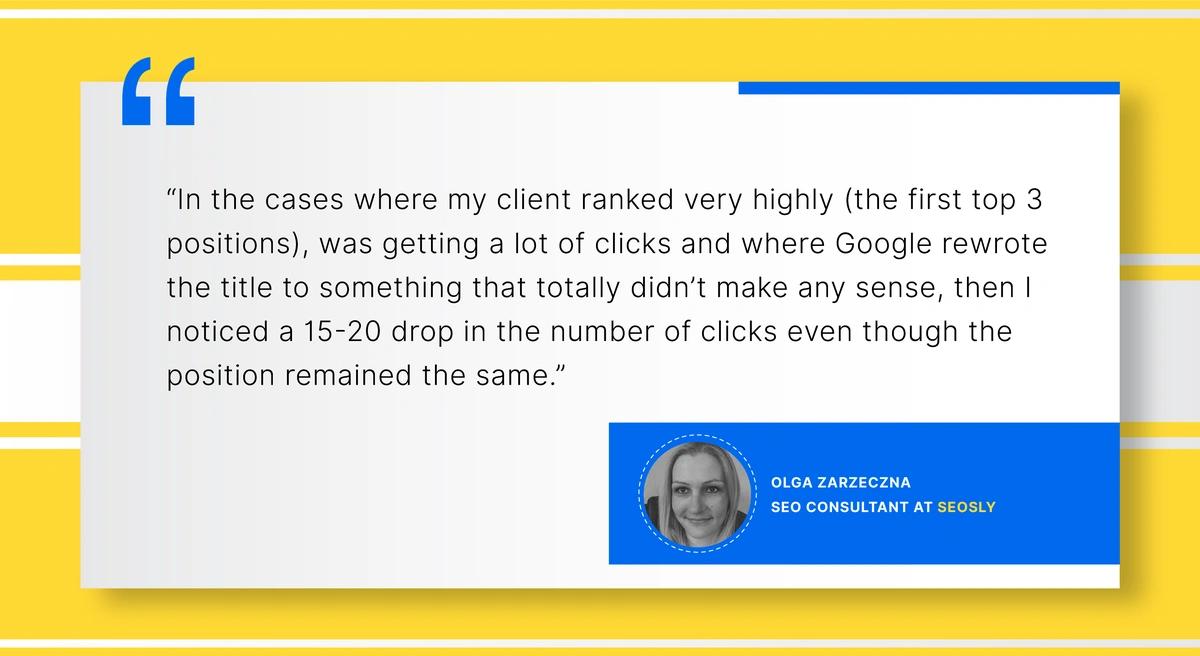
“In the cases where my client ranked very highly (the first top 3 positions), was getting a lot of clicks and where Google rewrote the title to something that totally didn’t make any sense, then I noticed a 15-20 drop in the number of clicks even though the position remained the same. However, this was fixed after some time and the traffic in most cases got back to normal,” replied Olga Zarzeczna.
“It indeed Impacted CTR on some pages as we noticed some Fluctuations in CTRs after randomization of titles. I would say it didn’t have a huge impact and for now, everything has been turned to normal. Pages with Longer Titles had a higher probability of being rewritten by Google,” suggested Devendra Saini.
Kyle Kozie shared a detailed response:
“It’s hit and miss. We work with over 70 clients so we come across instances where titles are changed and instances where Google likes our optimized title. We also come across instances where the rewrites help us from time to time in terms of CTR and instances where the rewritten title that Google pulled from the article hurts us with a lower CTR. For the majority, our optimized titles are good enough as we use information that is displayed in the article anyway. However, if we don’t want to leave it up to chance it gives us one more thing to worry about when crafting SEO-optimized content. While we can’t fully control what Google is going to do, we can do our best to write content and our own title tags that will display well within the SERPs and promote click-throughs.
All in all, we see dips now and again not because our ranking fell (which this update has no impact on), but because the title Google chose isn’t great or interests users enough to click on our client’s listing. We then have to go back and revisit the article and the section Google is pulling as being worthy or relevant for the title tag.”
Finally, Yaser Ayub suggested that this update hasn’t impacted their clients in terms of organic traffic: “Google is always rolling out new updates, especially in the past year, and this one hasn’t impacted our clients or their SEO at all. They say it might impact CTR but it hasn’t so far. All our clients are doing great.
Yaser’s advice is to focus on the overall quality of your content on your website, instead of worrying about title tags. Google’s updates are aimed at improving the quality of the content on the search engine and improving the user’s experience, so focus on that.”
We also surveyed experts to know if they think Google rewriting meta titles on its own is one of the most challenging updates to deal with. Here’s what we learned.
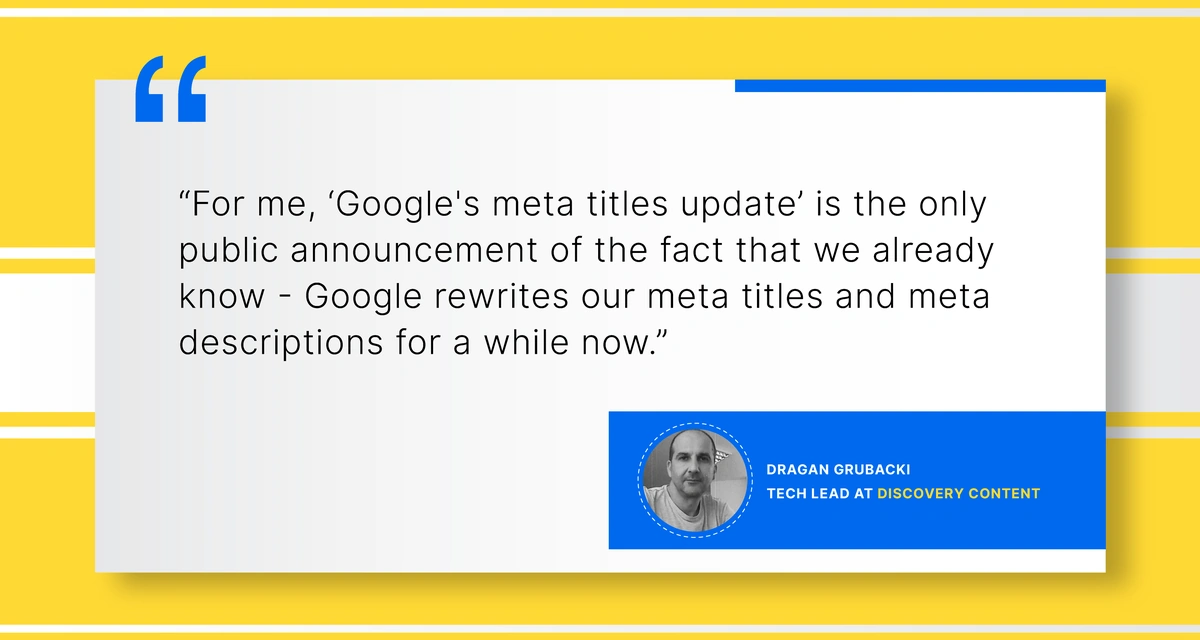
“For me, ‘Google’s meta titles update’ is the only public announcement of the fact that we already know – Google rewrites our meta titles and meta descriptions for a while now. This happens when we (in Google’s opinion) miss the title based on the content or the content does not reflect our desired title tag. Changes are almost always very small and on the point. This is not a big problem at all, similarly to personalized search results, we need to get accustomed to the fact that each searcher might not see the same title,” explained Dragan Grubacki, Tech Lead at Discovery Content.
“I wouldn’t say it’s more challenging, however in contrast to the more frequent broad Google core updates this update was very specific and thus actionable. Google provided information about the reasons for meta titles being rewritten. So by comparing your title tags with the titles Google displays, it’s possible to make reasonable assumptions about why Google made the change in many cases and act accordingly,” replied Matthias Lugert, CMO at Seobility.
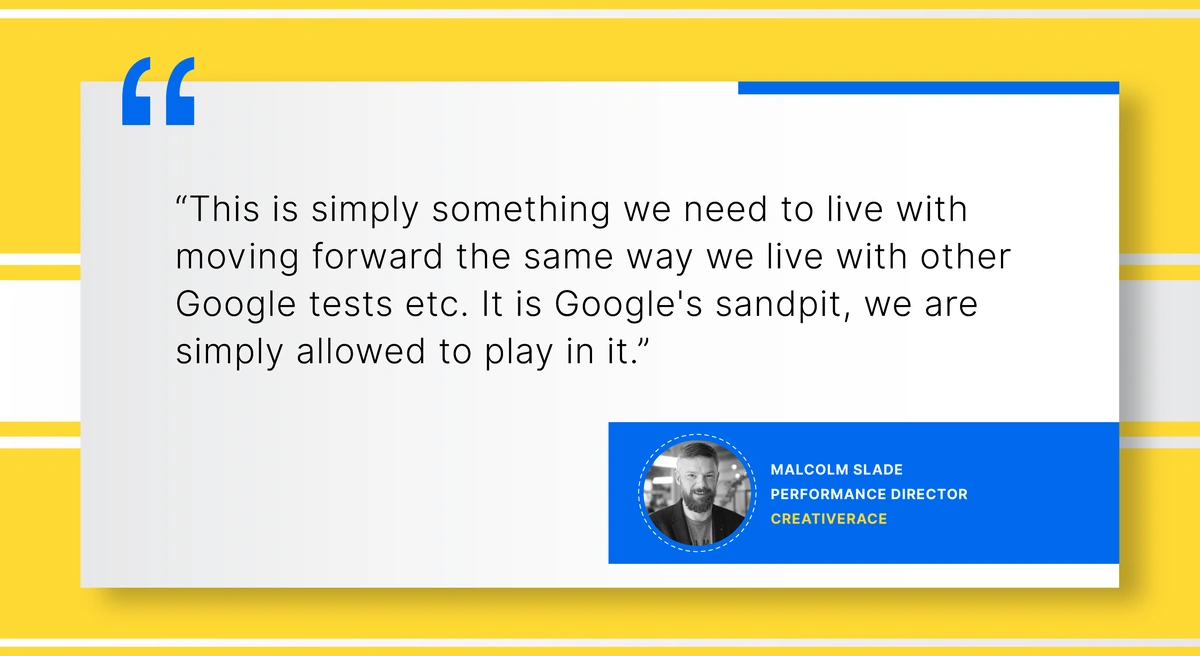
“This is simply something we need to live with moving forward the same way we live with other Google tests etc. It is Google’s sandpit, we are simply allowed to play in it,” suggested Malcolm Slade, Performance Director at CreativeRace.
“The important thing to realize is that this is just a visual change in SERPs rather than Google being dismissive of the title you present. While this can have random effects on click-through rates, I have seen no evidence of it affecting rankings. One positive is that if Google is rewriting the title for the main term (the one term that rules them all) relating to your page, this might be a sign that something is off with your existing title and you might want to test some amends,” elaborated Slade.
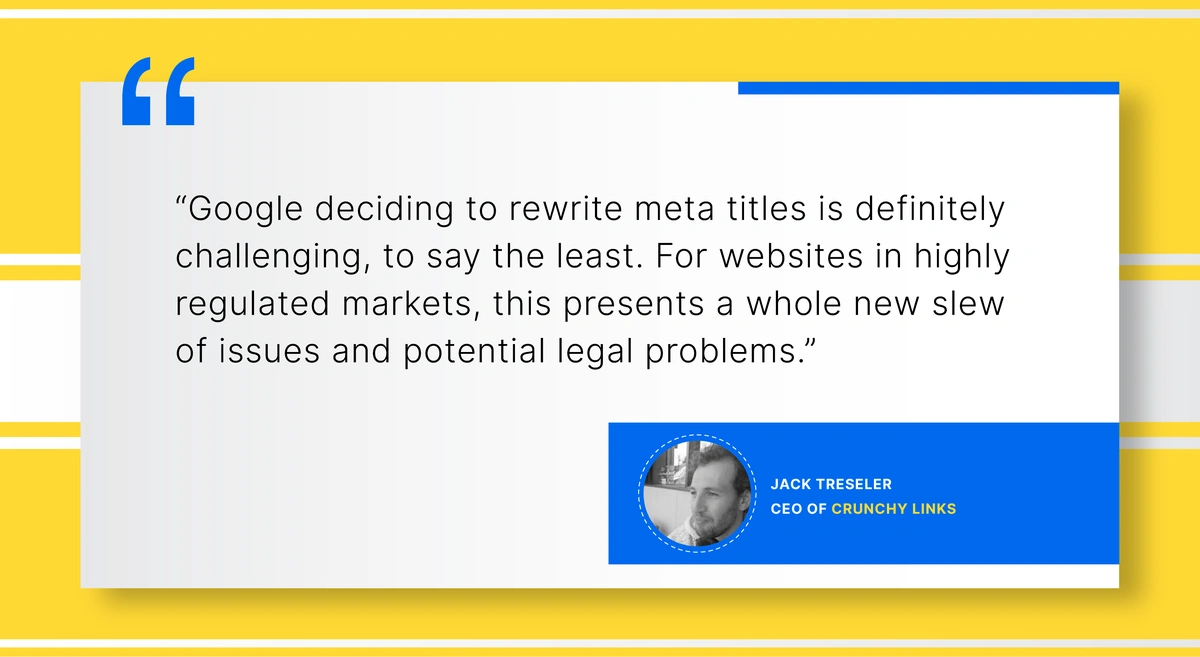
“Google deciding to rewrite meta titles is definitely challenging, to say the least. For websites in highly regulated markets, this presents a whole new slew of issues and potential legal problems. There have already been examples of Google deciding to use a different title tag than what was originally written, and causing misinformation or creating a legal risk where there didn’t need to be one,” replied Jack Treseler, CEO of Crunchy Links.
“The idea of changing meta titles in and of itself isn’t a bad one, given all the websites that don’t employ SEOs to help, but I don’t think they thought through the legal ramifications of it, which is a problem. But we’ve generally seen among our clients that if they have a website that Google thinks has high-quality content and good internal linking, they’re less likely to have their title tags changed. It definitely presents a challenge, but quality content, strong internal linking, and getting developer and executive buy-in present bigger problems that SEO’s can control, and should probably focus more on,” explicated Treseler.
Check out our comprehensive guide on internal linking for SEO.
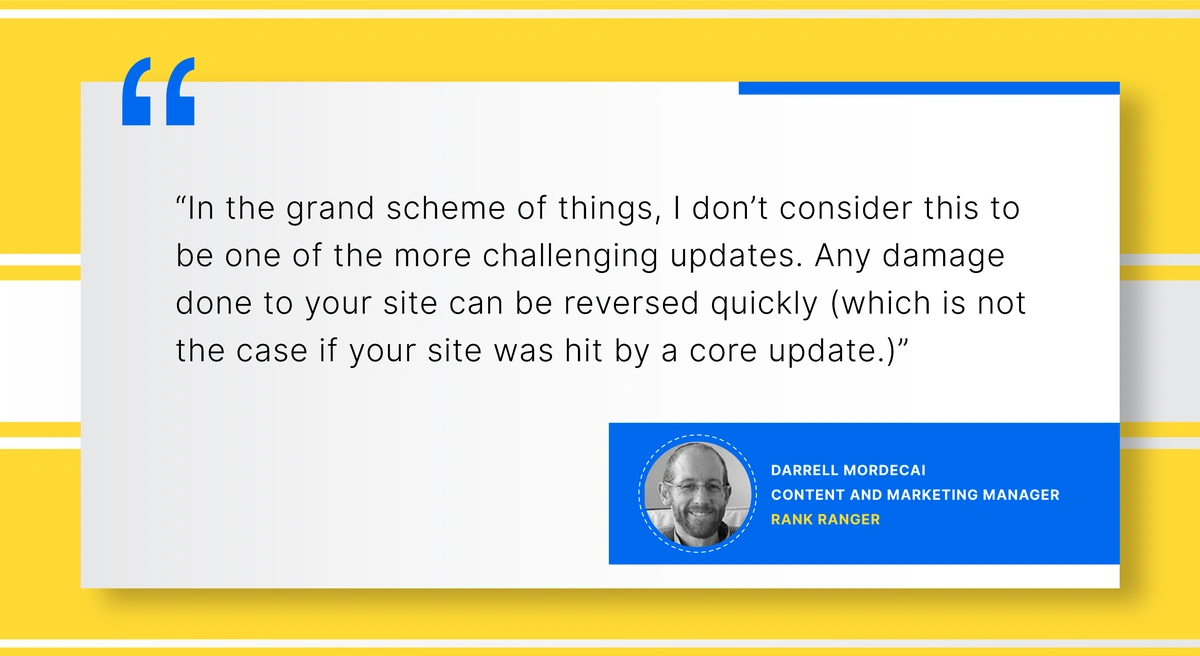
Darrell Mordecai, Content and Marketing Manager at Rank Ranger shared a comprehensive response:
“In the grand scheme of things, I don’t consider this to be one of the more challenging updates. Any damage done to your site can be reversed quickly (which is not the case if your site was hit by a core update.)
Here is a simple process you can follow.
The first thing you need to do is to see what changes Google is making.
Next, understand where Google is getting the text for the new title. This should be fairly simple to do. The first places to look are the titles in the content. More often than not, it means the H1 but could be another header e.g. H2, or even from the body text.
If you can’t find the text, it might be coming from the anchor text of a link pointing to your page.
Once you’ve found the place the title is coming from, it’s time to experiment. With a few edits, you can hopefully compel Google to rewrite the title to something that works for you.
As with most things in SEO, it’s more art than science, so don’t be afraid to experiment.”
Furthermore, he also shared some neat insights on dealing with Google’s page title update:
“Google’s Page Title update caused a storm in the SEO community.
The reason is as with anything when the update was originally rolled out, it made some hilarious mistakes. Well, mistakes are only hilarious when they happen to someone else’s business.
So before I give my two cents on the update, Google has made changes to page titles long before the update.
How do I know?
Two reasons:
- Google admitted to doing it
- I noticed Google doing it using the Rank Ranger SEO monitor
It’s also important to understand that when Google changes your page titles, the changes do not affect your rankings.
So, what was all the fuss about?
This screenshot from Lily Ray’s Twitter account sums it up nicely.
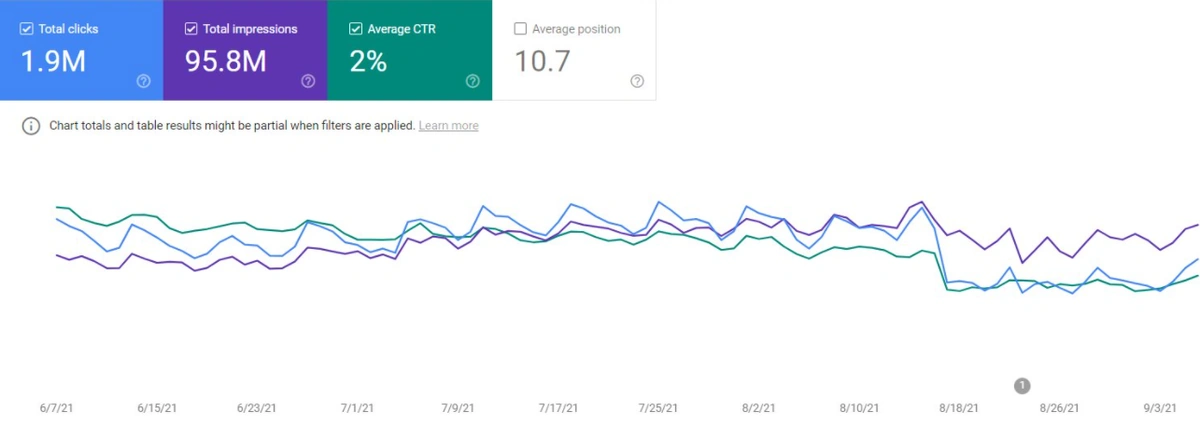
She reported at the time that this client had a 32% decline in organic revenue. This is because bad titles can affect your click-through rates.”
Last but not least, Aaron Wall, Founder at SEOBook, outlined the bright side of this update:
“Google has been rewriting page titles in the search results for over a decade. If you go back far enough in time, when they were less sophisticated at filtering out the impacts of scraper sites, in some spammy categories you had to regularly rotate page titles to prevent getting filtered from the result set. That stuff was harder to troubleshoot than the current changes.
In most cases when Google rewrites a listing they try to better align the essence of the page with the user intent commonly associated with the search.”
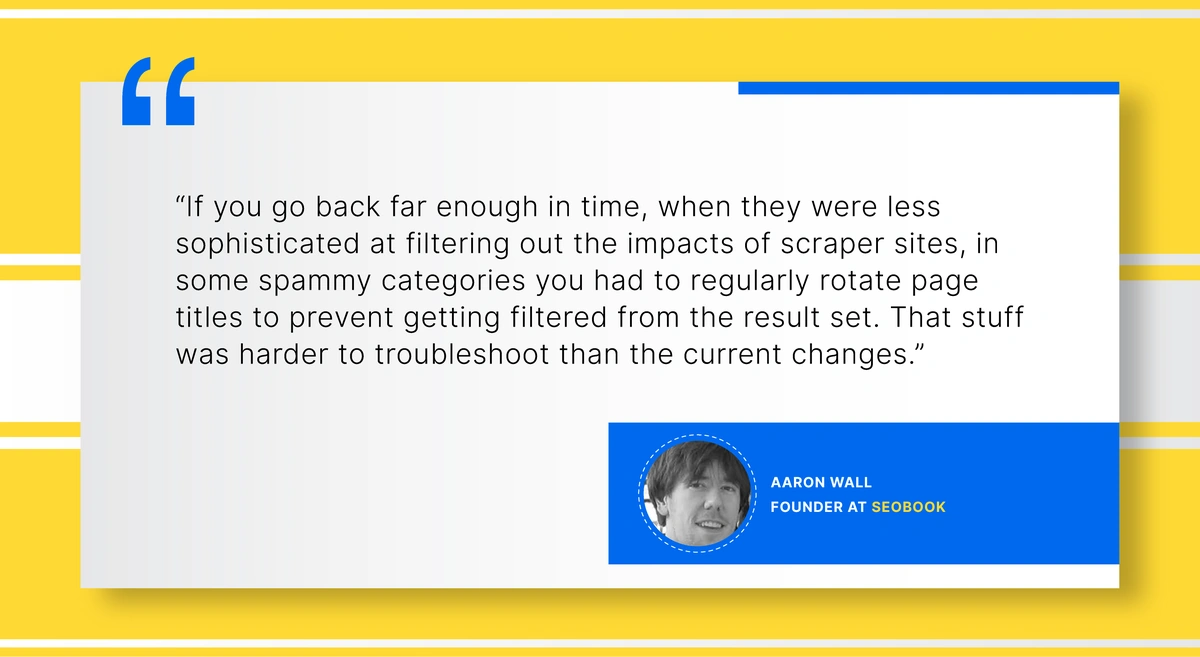
Learn from Google’s Best Practices for Writing Meta Titles
Similar to Cyrus’s guidelines, Google itself has neatly described some best practices for writing descriptive title elements:
- Ensure every page on your site has a descriptive yet concise title specified in the <title> element.
- Don’t do keyword stuffing.
- Avoid repeated or boilerplate text in <title> elements. For example, titling several pages “Affordable parts for sale”, makes it impossible for users to distinguish them.
- Brand your titles concisely.
- Be careful about disallowing search engines from crawling your pages. If you do wish to prevent a URL from being indexed, use the noindex directive.
Check out Google’s advanced SEO documentation to dive deeper into each.
How Google is Responding To Concerns
Many website owners reported issues with the update when it was first announced, such as:
- Content not found on the page
- Inconsistent capitalization
- Inaccurate search intent
For example, look at the screenshot below, as shared by Jennifer Slegg (an SEO writer) on Twitter.

So, how is Google responding to such concerns? Well, they opened a thread where you can share feedback on the new update and reply with screenshots as well as the URLs of your affected pages.
Moreover, Danny Sullivan responded to some tweets, hinting at an option in Google Search Console that will allow webmasters to pick which pages they don’t want to have automatic title tags.
Tools to Analyze Your Title Tag Changes
While you can try to reduce the odds of Google rewriting your titles, rest assured you’ll see some of your titles rewritten. So it makes sense to monitor your SERP title changes, at least for your most popular and high-business value pages, if not all.
There are quite a few tools you can use to analyze your title tag changes in the SERPs. Let’s see what the experts suggest.
“Firstly, we use SEO tools like the Seobility SERP Snippet Generator to optimize our title tags and increase chances that Google doesn’t rewrite our titles in the first place. Secondly, tracking if titles are being rewritten by Google is a feature of the Rank Tracking function of Seobility.
Ultimately, we also monitor the click-through rates of our most important pages using the Google Search Console and do manual checks of search results when we notice any significant drops,” explained Matthias Lugert.
“Ahrefs, but manually checking SERPs gives you the best results,” replied Dragan Grubacki.
“In terms of monitoring, I use Python, Sistrix, and Semrush as well as NordVPN to manually check for other locations,” said Malcolm Slade.
“Sistrix does an amazing job tracking title tag changes. They have a whole section dedicated to tracking those on their platform. If you don’t want to pay for a tool like that, I’d suggest setting up a custom alert in Google Analytics to notify you if traffic dropped by a certain amount, then check if the title tags have been changed,” explained Jack Treseler.
Darrell Mordecai neatly explained the use of Rank Ranger tool to track title changes:
“The Rank Ranger SEO Monitor is a perfect place to see any page title changes.
The tool monitors 30 days of data. If there are any changes to your Search Snippet, the changes are recorded. The SEO Monitor doesn’t just tell that there has been a change. It also tells you what was changed and literally shows you all the versions of the snippet.
In the screenshot below, the SEO Monitor is demonstrating small changes to the title of a Search Snippet.
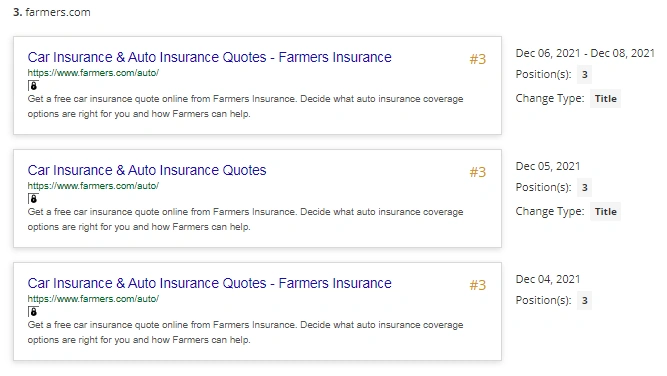
Conclusion
So, is Google rewriting your title tags a big deal? As most experts agree, not exactly. The search giant has been doing so for almost a decade, the only change is how their system is now trying to craft titles that work better for documents overall — to better describe each search result’s contents irrespective of the particular search query.
Furthermore, Google admits that their dynamic title-producing system isn’t perfect and will never be. They continue to welcome feedback from webmasters to refine the system and their main advice to website owners remains pretty much the same: “Focus on creating great HTML title elements. Those are by far what we use the most.”
All in all, that’s what the key takeaway is — all you can really do is try and craft user-optimized HTML title tags that accurately outline your page’s content and address the concerns of the searcher. Do that well, and it’s likely Google bases its rewrite on it (or doesn’t rewrite at all!).


